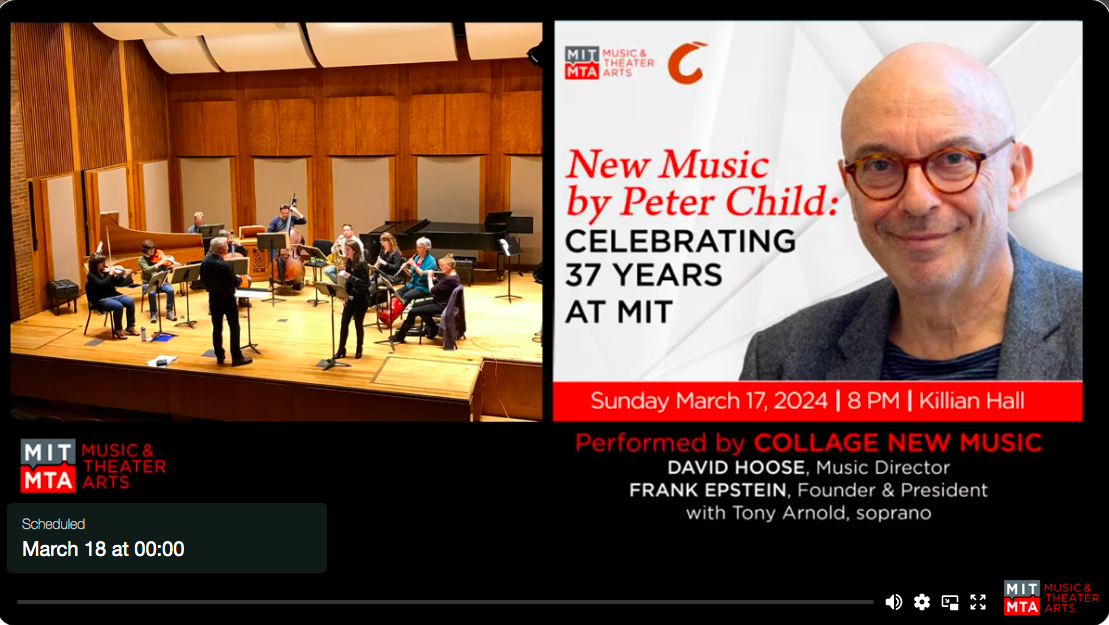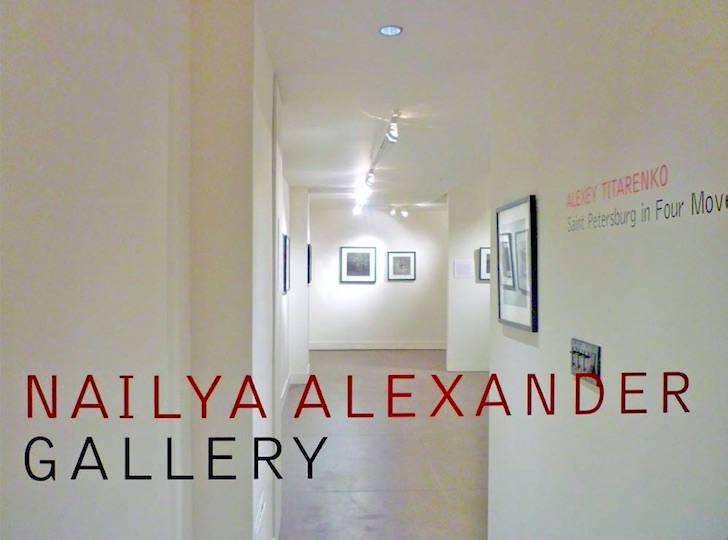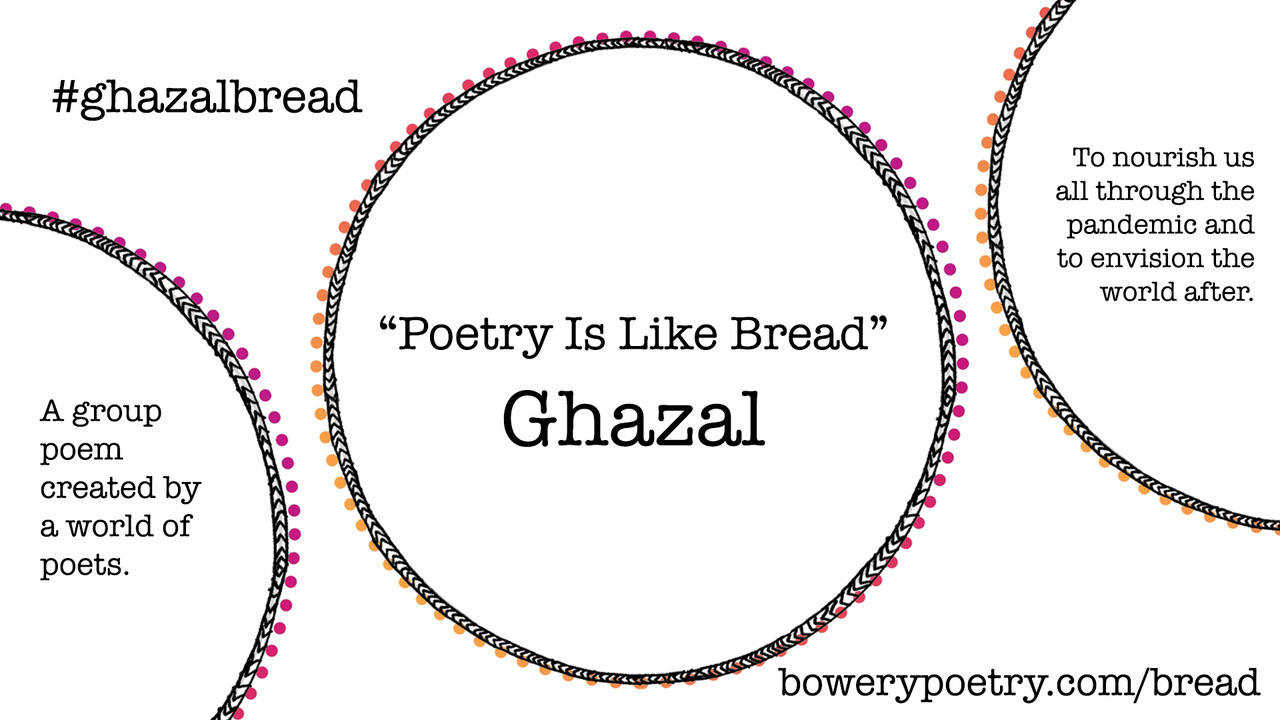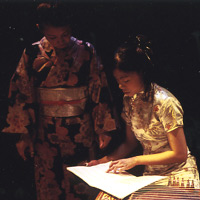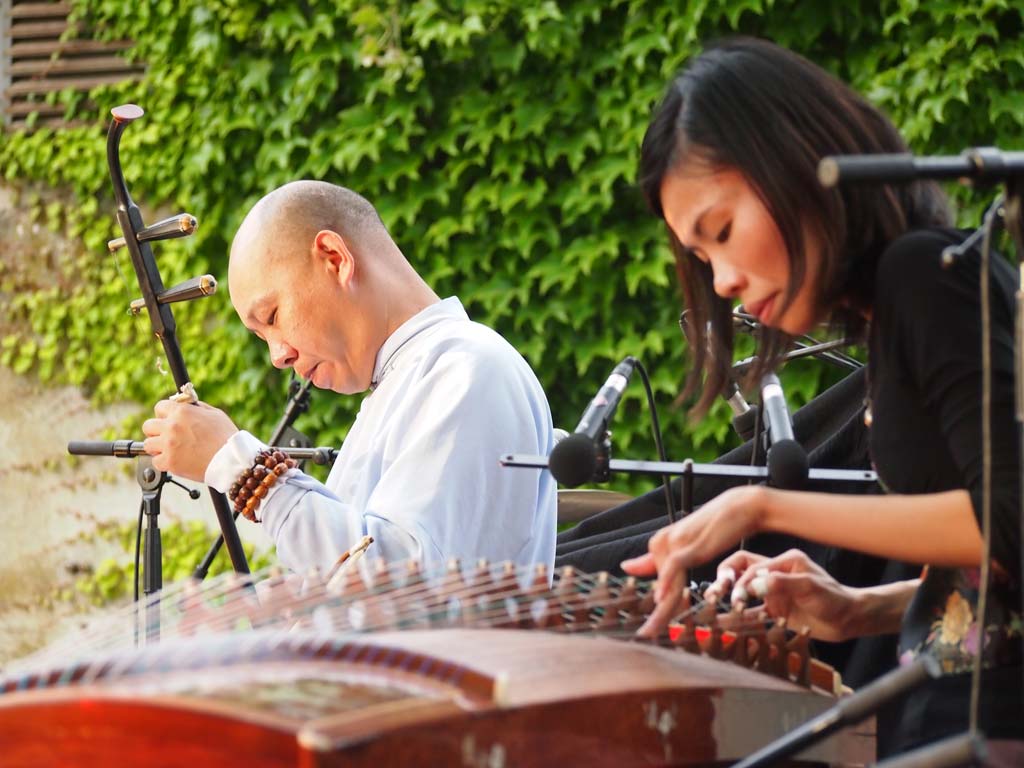Selected Collaborations
Untouchable (poem) and The Year of the Rat (poem cycle)
Set to music by Peter Child
Sung by Tony Arnold (soprano)
Performed by Collage New Music
March 17, 2024, 8 pm EST
Massachusetts Institute of Technology (MIT), Killian Hall
"Untouchable" is part of Child's new composition A Golden Apple: Six Poems of Intimacy and Loss (2023).
"The Year of the Rat is a collaboration with poet Fiona Sze-Lorrain. She wrote four new verses that reflect her experiences of the pandemic in Paris, where she lives. The poems are taut and allusive, with crystalline rhythms and symbolic imagery typical of Sze-Lorrain’s work. ‘A Nonbiological Response,’ in particular, evokes for me the harshness and isolation of those times, our distance-preserving bends around approaching pedestrians, our anxious avoidance of touch, and, for many, our loneliness:
Then the stone in a jar—
not to be touched, but must
be healed—
putting on its best behavior
at each ripple curve.
In my song settings I tried only to follow the rhythms and amplify the emotional trajectory of Sze-Lorrain’s evocative imagery."
—Peter Child, composer
Read concert program notes (PDF)
Read a review in The Boston Music Intelligencer
City of Hidden Lives
Online Exhibition at Nailya Alexander Gallery
Photography by Alexey Titarenko and Pentti Sammallahti
Poetry by Bo Carpelan and Fiona Sze-Lorrain
March 1 - April 3, 2021, New York
View the online exhibition here
Read press reviews in StyleZeitgeist and Art Daily.
The Year of the Rat
Poems set to music by Peter Child
Virtual Première by the Cantata Singers, February 6, 2021
Performed by Amy Liberman (mezzo), Xiao Shi (tenor),
Sheryl Krevsky Elkin (mezzo), and Karyl Ryczek (soprano)
Watch and listen to The Year of the Rat at 21'54"
"The Year of the Rat is a setting of new poems by Fiona Sze-Lorrain written especially for this performance. The poems are deeply personal, illuminating responses to the pandemic in Paris, where Sze-Lorrain lives and works, and the musical settings are for unaccompanied voices drawn from the chorus of the Cantata Singers." —Peter Child, composer
Read more about the digital concert / presentation, the second in the Cantata Singers' 2020-21(Reimagined) Season
"Poetry Is Like Bread," Bowery Poetry
Ghazal couplet video contribution from Sze-Lorrain
Watch collaborative poem video here
Read more here
Columbia Institute for Ideas and Imagination

"A Lot Had Happened," a five-act play by Fiona Sze-Lorrain,
audio reading by Oscar Olivo

"Love Theme Caine," composed by Pauchi Sasaki,
zheng music by Fiona Sze-Lorrain
A Blue Dark
Joint Exhibition with Fritz Horstman (Josef and Anni Albers Foundation) at the Institute Library (The Gallery Upstairs) in New Haven
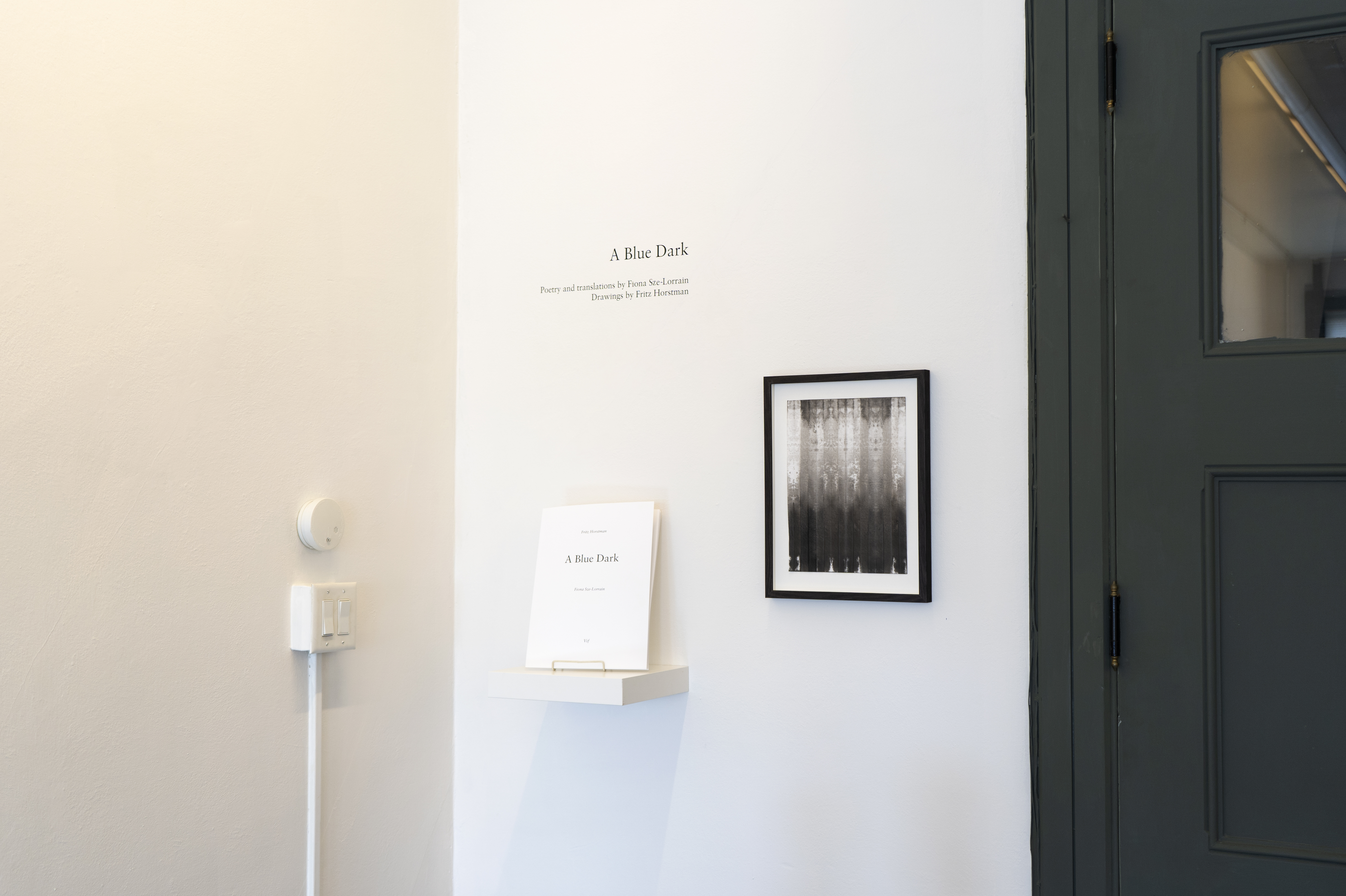 Exhibition A Blue Dark, 2019 | Photo © Fritz Horstman
Exhibition A Blue Dark, 2019 | Photo © Fritz Horstman
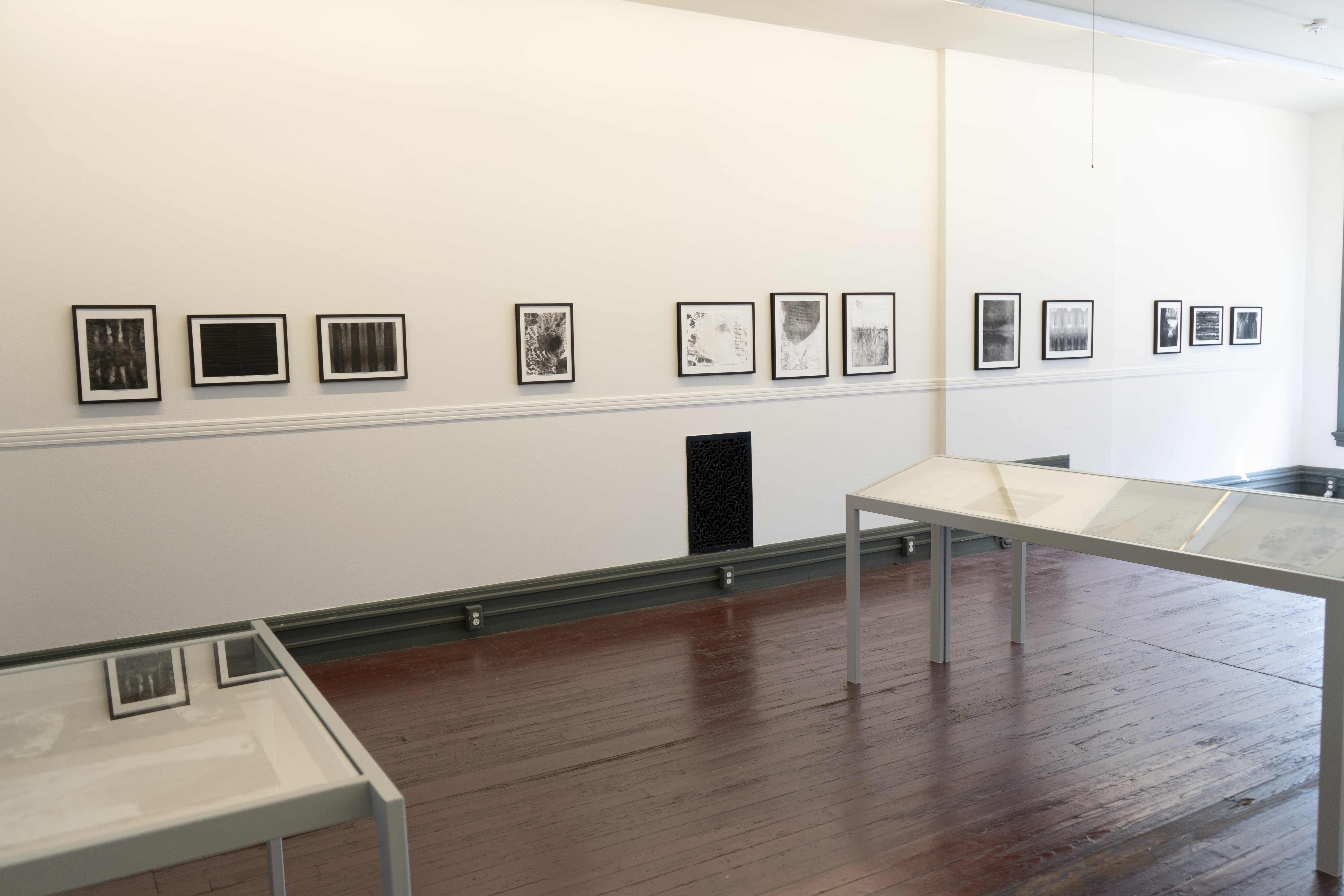 Exhibition A Blue Dark, 2019 | Photo © Fritz Horstman
Exhibition A Blue Dark, 2019 | Photo © Fritz Horstman
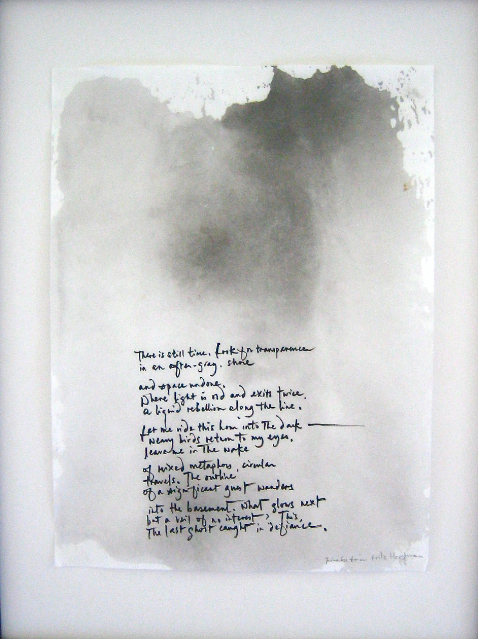 Handwritten poem on treated washi, from A Blue Dark, 2019 | Photo © Sze-Lorrain
Handwritten poem on treated washi, from A Blue Dark, 2019 | Photo © Sze-Lorrain
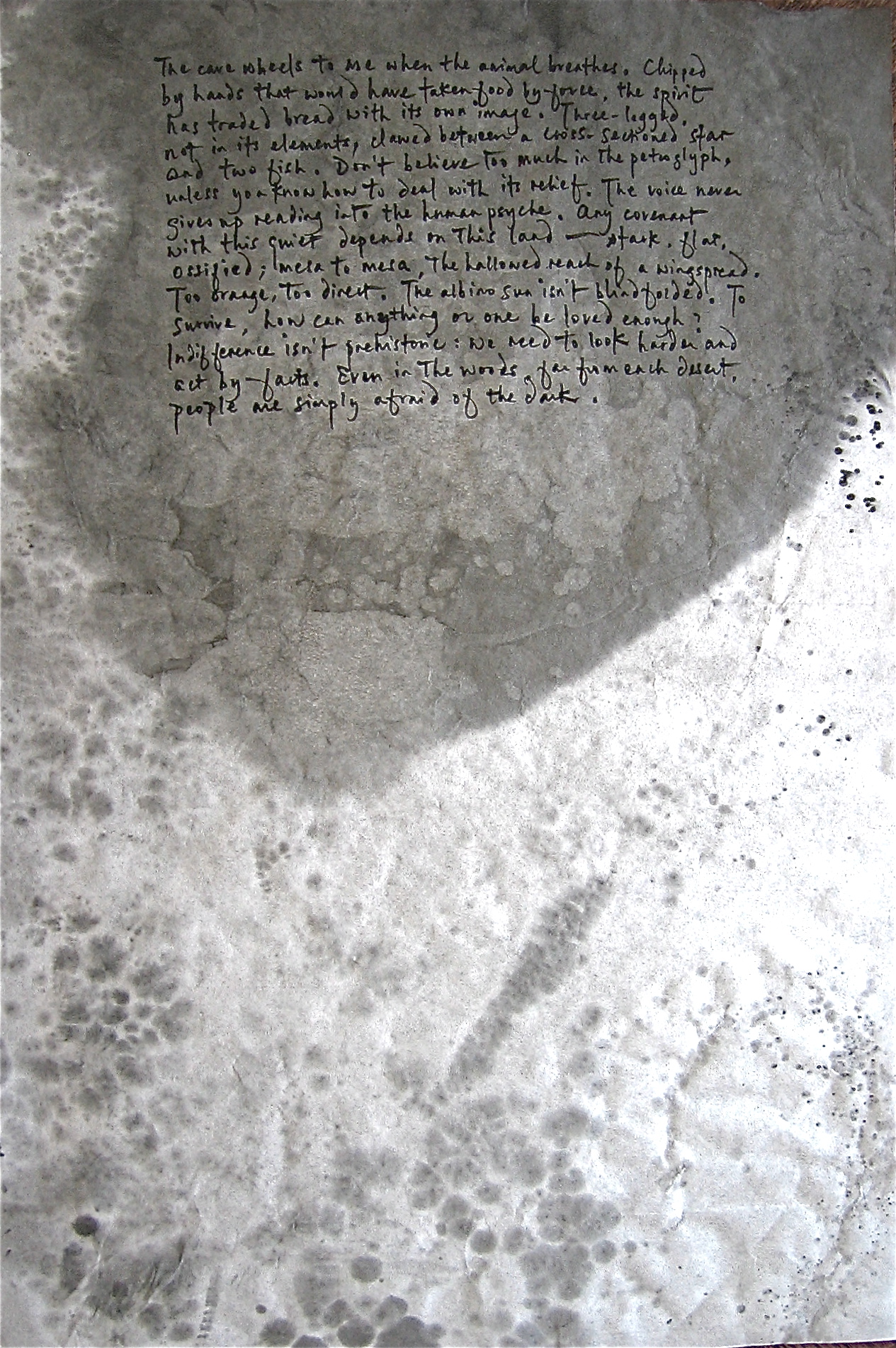 Handwritten poem on treated washi, from A Blue Dark, 2019 | Photo © Sze-Lorrain
Handwritten poem on treated washi, from A Blue Dark, 2019 | Photo © Sze-Lorrain
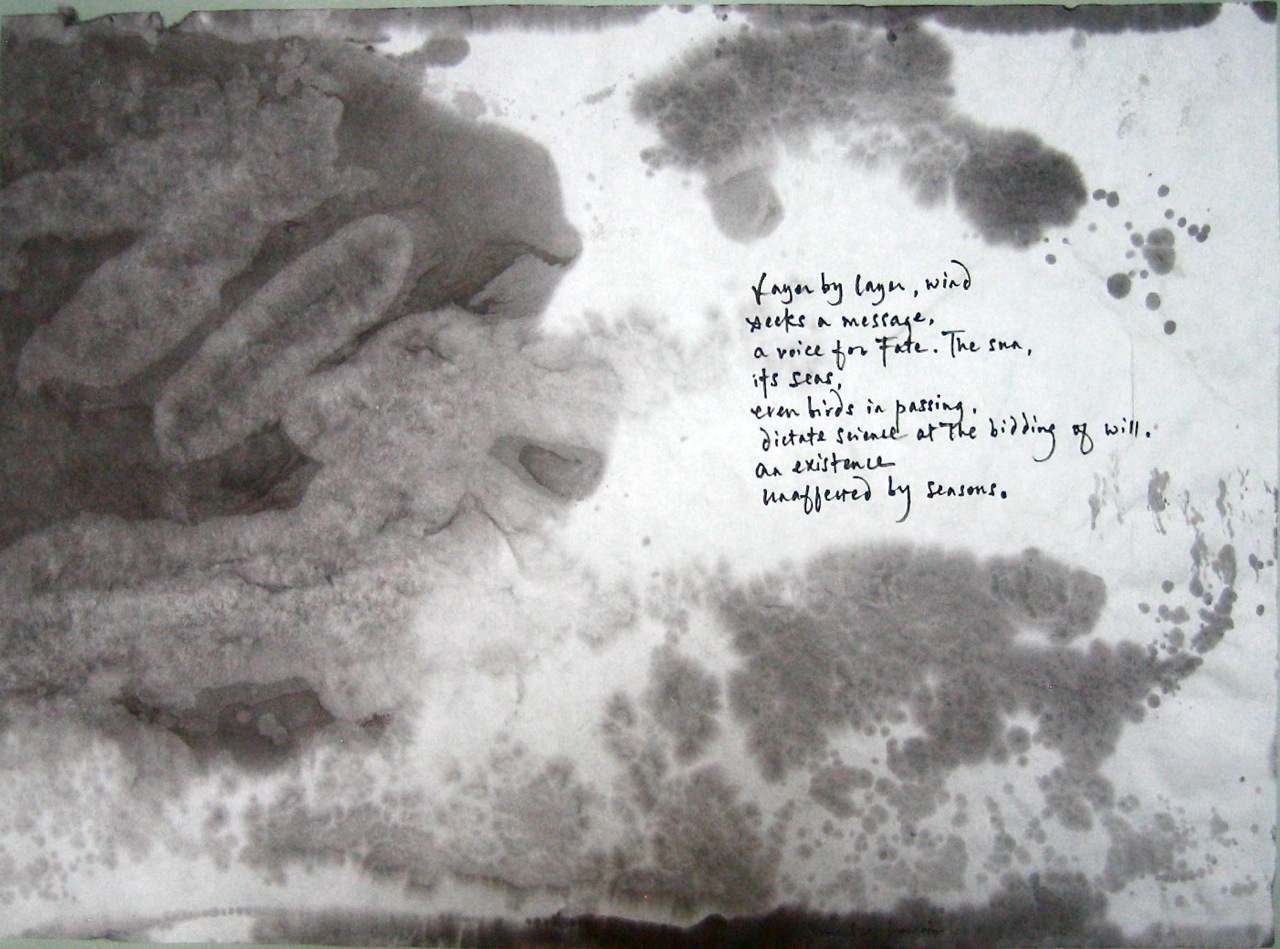 Handwritten poem on treated washi, from A Blue Dark, 2019 | Photo © Sze-Lorrain
Handwritten poem on treated washi, from A Blue Dark, 2019 | Photo © Sze-Lorrain
Bridging Cultures
"Guzheng Plays Another Music" Preview | en français
Music
- Cantata Singers and Ensemble (chorus and orchestra)
- Child, Peter (composer)
- Chinese Music Ensemble of New York
- Feltesse, Sylvie (Mezzo)
- Guo, Gan (erhu)
- Norderval, Kristin (Soprano)
- Sasaki, Pauchi (Composer, Performer, Improviser)
- Wang, Changyuan (zheng)
- Wangdu, Tshering (Tibetan flute, lute, viol, drums)
- IIIZ+ Ensemble (changgu, koto, kayagûm)
Visual Arts
- Horstman, Fritz (Visual Artist)
Performing Arts
- Gao, Xingjian (Theater)
- Garnica, Ximena (Butoh)
- Howard, Pamela (Theater)
- Olivo, Oscar (Puppetry)
- Initiation International (Theatre)
Music
Peter Child (Composer)
Peter Child is the Class of 1949 Professor of Music, Margaret MacVicar Faculty Fellow at the Massachusetts Institute of Technology (MIT). He earned his Ph.D. in composition from Brandeis University. A recording of Shanti and other orchestral works was released by BMOP/Sound in 2018. Recent commissions include Lamentations, with the Cantata Singers, hailed after its January 2018 premiere as "deeply moving" (Boston Musical Intelligencer), "a powerful work" (Arts Fuse), music that "hits its mark with music by turns insistent, anguished, supplicatory, ad, at the end, white-hot" (Boston Globe). Peter Child was awarded a 2015 Artists Fellowship by the Massachusetts Cultural Council. He was League of American Orchestras' "Music Alive" composer-in-residence with the Albany Symphony Orchestra (2005-08) and composer-in-residence with the New England Philharmonic Orchestra (2005-11). He was born in England and has lived in the US since enrolling at Reed College through a junior-year exchange program. His composition teachers include William Albright, Bernard Barrell, Arthur Berger, Martin Boykan, Jacob Druckman and Seymour Shifrin.
Child's work has earned awards and commissions from the Boston Musica Viva, Chorus pro Musica, the University of Southern California, the James Pappoutsakis Memorial Foundation, the Jebediah Foundation, Bank of America Celebrity Series, Music of Changes, the Fromm Foundation, the Harvard Musical Association, Tanglewood, WGBH Radio, East and West Artists, the New England Conservatory, League/ISCM, and the MIT Council for the Arts, as well as three Artists Fellowships from the Massachusetts Cultural Council. He has received fellowships from the Watson Foundation, the MacDowell and Yaddo Artists Colonies, and the Composers' Conference at Wellesley College, and four 'New Works' commissions from the Massachusetts Council for the Arts and Humanities. Child's music has been extensively recorded on the Lorelt, New World, Naxos, CRI, Albany, Innova, Centaur, and Rivoalto labels.
The Cantata Singers and Ensemble
Founded in 1964, Cantata Singers is a Boston-based chorus and orchestra whose roots lie in the music of Johann Sebastian Bach. The ensemble's main season and chamber concerts now explore a wide range of music that reaches from the 17th century to the present, often exploring connections to Bach’s continuing and profound influence on our music, our culture, and ourselves. David Hoose serves as the Music Director, Allison Voth the Chamber Series Director, Amy Liberman the Assistant Conductor, Nick Adams the Executive Director, and Michelle Rush the Director of Community Engagement and Artistic Planning.
Their unique education program, Classroom Cantatas, teaches song-writing and choral singing to under-represented Boston schoolchildren, guided by the belief that all children deserve the means to express their creative voices.
Bach's music, from the cantatas to the passions, remains an essential part of Cantata Singers' repertoire, even as the ensemble's repertoire has expanded to include music from the 17th century to today. Cantata Singers has commissioned sixteen works for choir and orchestra—including one that was awarded the Pulitzer Prize in Music—and has presented more than fifty Boston premieres of music, both old and new.
Many of Boston's most talented musicians perform regularly with Cantata Singers. The chorus is made up of singers who have careers as musicians, educators, doctors, and architects. Many appear as soloists with Cantata Singers, as well as with other highly respected organizations; some conduct other choruses and orchestras.
Wang Changyuan (zheng)
Considered to be one of the most famous contemporary guzheng performers in the world, Wang was born in Hangzhou, China. She grew up in a musically renowned family as a child prodigy and received her formal musical education from Shanghai Conservatory of Music. Her father, Wang Xunzhi, a reputed professor and composer of zheng music, was a strong advocacy of Zhejiang traditional zheng music and founded his own school of zheng performance.
Wang has made numerous recordings, all of which span across the entire zheng history of China. Since the 60s, Wang has received various state and international honorary awards. She made appearances with all major Chinese orchestras in mainland China, notably as a soloist with Shanghai Traditional Chinese Orchestra of Music and Central Traditional Orchestra of Music. Her own compositions (such as "Fighting the Typhoon") now remain as the classics of modern guzheng pieces.
After the Chinese Cultural Revolution, Wang moved to USA where she continues to teach and perform worldwide. In the 1980s, she often appeared as soloist and conductor of Chinese Music Ensemble of New York. Now residing in New York, she founded the Wang Changyuan Zheng Academy. Many of her students are currently active in the international musical scene.
Pauchi Sasaki (Composer, Performer, Improviser)
Pauchi Sasaki is a composer, performer, and improviser who recreates intimate subjective landscapes through electro-acoustic sonorities, influenced by improvisational aesthetics and ethnic musical traditions. Her interdisciplinary approach integrates musical composition with the design of multimedia performances, the application of new technologies, and the development of self-designed instruments. Her film scores appear in more than thirty feature and short films. She has received three "Best Original Score" international awards, the Ibermúsicas Latin American grant for sound composition with new technologies at CMMAS, The Rolex Mentor and Protégé Arts Initiative selected by composer Philip Glass, and the Goethe-Institute’s artist residency in Brazil and Berlin. Her work has been presented at the Tokyo Experimental Festival, Lincoln Center's Mostly Mozart Festival, The Kitchen, Carnegie Hall, Walt Disney Hall, the MET, the Venice Biennale, the Gran Teatro Nacional del Perú, among other venues.
IIIZ+ Ensemble: changgu, koto, kayagûm
IIIZ+ performs modern and traditional music for the three large bridged zithers of East Asia by both Asian and Western composers, offering insight into the musical and cultural interactions of China, Korea, Japan and the West. Their focus on one instrument family makes prominent the similarities and differences of national musics from East Asia, while creating an entirely new sound.
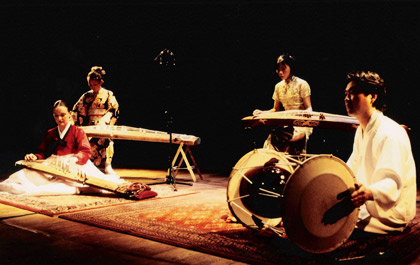
Performing with IIIZ+ at Maison des cultures du monde, Paris, 2004
IIIZ+ Concert at La Maison des cultures du monde
[MondoMix.com] by Arnaud Cabanne
Watch Video: IIIZ+"Three Zithers and a Pair of Scissors"
(Composed by Stefan Hakenberg, 1998)IIIZ+ Ensemble International Tour 2004
Feature Press Article in Juneau EmpireMarch 15, 2004 - Paris, France
Festival de l'imaginaire, IIIZ+February 26, 2004 - New York, USA
(PDF Download 64KB)
North River Music, Renee Weiler Concert Hall
IIIZ+: The name "IIIZ+" is intended to be an egalitarian one that is not language-specific, but, unlike 'the artist formerly known as,' also pronounceable in any language. The initial realization of the idea for IIIZ+ came about in 1998 when the committee in charge of the celebration of the opening of the new Asia Center at Harvard University approached Jocelyn Clark to put together a concert that would celebrate the coming together of the disparate cultures represented at the Center. A concert featuring the zither traditions of China, Korea and Japan playing together had been a long-time dream of Clark's who had studied those three traditions since she was a teenager. The ensuing "Encounters" musical celebration, and the newly commissioned compositions, became the seed of IIIZ+, founded in Darmstadt, Germany, the Mecca of new music in the West, in 2001. Since, IIIZ+ has completed two successful tours in Europe and the US. Their 2002 tour culminated in a concert jointly hosted by the embassies of Japan and Korea that celebrated the World Cup in Washington D.C. Following that, IIIZ+ received honorable mention at the 2003 Werkstatt der Kulturen's Musica Vitale word music competition in Berlin. They will start their 2004 tour in New York City and end in Paris at the Maison des cultures du monde's Festival de l'Imaginaire, and play new works by L.A. composer Hiroko Ito and Berlin composer Il-Ryun Chung, and the existing work Three Zithers and a Pair of Scissiors by Alaska composer Stefan Hakenberg, among others.
Consult IIIZ+'s official site: www.threezeeplus.com
Il-Ryun Chung (changgu and guitar) was born in Frankfurt, Germany in 1964. From 1967 to 1971, he lived in Seoul, Korea. At the age of 16, he taught himself to play the guitar and in 1984, went to Berlin to study guitar and composition with Carlo Domeniconi. In 1992, he received a composition stipend from the Berlin Senate to continue in composition and in 1994, was awarded at the Berlin Festival for his Movement in Circles II (for flute and guitar). He completed his studies in composition at the Berlin Music Academy (HdK) in 1995 with Jolyon Brettingham-Smith. An encounter with the Korean master drummer Kim Duk-Soo made a lasting impression upon Chung's rhythmic perception. In 2000-01, he worked on a concerto for SamulNori and Orchestra. Collaboration between composer and interpreter has been central to his compositions, which, despite acute concern for idiomatic instrumental writing, always places the highest technical demands upon the performer. Concertizing as solo guitarist, chamber musician, and drummer for traditional korean music also remains an integral part of his musical life. In 1997, he founded with the violinist Matthias Leopold Duo Saitenwege (violin and guitar). In 2001, he co-founded IIIZ+. His works are published by Verlag Neue Musik and recorded by kreuzberg records.
Jocelyn Clark (kayagûm) grew up in Juneau, Alaska, playing the piano, clarinet and oboe. After a year in Japan, she started studying the koto at age 18 with the Sawai Koto Academy under Yagi Michiyo, and later Maruta Miki at Wesleyan University. In 1990-1 she studied zheng at the Nanjing Academy of Arts in China, and then in New York with master Wang Changyuan. From 1992 to 1994, she received a scholarship to study traditional Korean music, majoring in kayagûm performance at the National Classical Music Institute in Seoul, Korea. She returned in 1995 to study kayagûm with a grant from the Harvard Korea Institute. In 1999-2000, she received a Fulbright Fellowship to study Korean traditional music in Seoul with Ji Aeri and "National Intangible Human Cultural Asset," Kang Jeongsuk. Clark won the KBS Korean Folk Arts contest for foreigners in 1994 and 1999, and the HBS contest in 1995. She has appeared on SBS and Arirang TV, and hosted her own radio show on the national traditional music broadcasting station, Kukak bangsong. In 2000-1, she returned to Korea on a Seonam Foundation Fellowship. She appeared at the 2001 Jeonju Sanjo Festival and at a private functions for the American Ambassador to Korea, the Korean ambassador to America, and the former US Secretary of State, James Baker. She is the co-founder and co-director of the new music festival, CrossSound in Alaska with composer Stefan Hakenberg, and founded IIIZ+ in 2001 with changgu player/composer Il-Ryun Chung (Berlin), and koto player Makiko Goto (the Netherlands). Her writing on the kayagûm appears in the notes of Hwang Byung-Ki's 2001 re-release box set in English, Korean, Japanese, and French. She is currently finishing her Ph.D. at Harvard University.
Masayo Ishigure (koto) began playing the koto and jiuta shamisen at the age of five in Gifu, Japan. After initial studies with Tadao and Kazue Sawai, she became a special research student in 1986 at the Sawai Koto Academy of Music. The aim of the academy was to shed new light on koto music by incorporating everything from Bach to jazz, thus changing the koto from a traditional Japanese instrument into an instrument of universal expressiveness. Later, Ishigure became one of a small group of disciples of the Sawais to have successfully completed the 33rd Ikusei-kai program (sponsored by NHK) to foster and train aspiring artists in Japanese music. In 1988, she received a degree in Japanese Traditional Music at Takasaki Junior Arts College with a concentration on koto and shamisen. The same year, she was recorded on the CD, The World of Tadao Sawai. In 1994, she also recorded for the CD, Tori no Yoni [Like a Bird]: Tadao Sawai Compositions. Since then, she has performed all over the world, and appeared in such festivals as "Bang on a Can" (NYC) and the "CrossSound" new music festival in Alaska. She has been featured in two public television broadcasts: Music Under New York and World of Music. In December 1997, she performed a classical program of traditional koto music at Carnegie Hall; in January 1998 at Merkin Hall as part of the Music from Japan series; and in March, during "Encounters" at Harvard University. In 1992, she began teaching koto and shamisen in the music department of Wesleyan University as an artist-in-residence where she formed the Wesleyan Koto Ensemble. She also offers private lessons as the only Sawai Koto Academy instructor in the New York metropolitan area.
Chinese Music Ensemble of New York
Founded in 1961, the Chinese Music Ensemble of New York is recognized as the only full-scale Chinese orchestra in the Americas. It maintains its standard of excellence through a program of musical exchanges with professional musicians from China, Taiwan, Hong Kong and Singapore. Many of its award-winning musicians come from the Music Conservatories of Shanghai, Beijing, Sichuan, Tianjin and Shenyang, the College of Chinese Culture of Taipei, and renowned orchestras in China.
With over forty musicians, the orchestra's repertoire range from ancient classical to modern compositions. Devoted to promoting Chinese music performance and education in USA, the Ensemble has since performed at major performing venues in New York as well as in schools, universities, libraries and museums throughout the East Coast.
Sylvie Feltesse (Mezzo)
After her piano studies, Feltesse, an evident mezzo, continues to pursue singing as a passion. She had received instruction from renowned professors, namely Mady Mesple, Mireille Alcantara and Simone Fejard. Now studying with Fejard, she also perfects her technique work with Linda Bond-Perry in New York and Paris.
Feltesse obtained her award for high performance from Union des Femmes Artistes Musiciennes (UFAM) in France, and has sung for various festivals, choirs, and churches in Paris.
She maintains a printing and engraving house in the heart of Paris, Les Lettres de Saint-Roch, whose traditions are dated from the 17th century.
Guo Gan (erhu)
Born in Shenyang, Guo comes from a family of musicians. His father, Guo Junming is a famous erhu (Chinese violin) master in China. At four, he began playing in public. A honors graduate from the Shenyang Music Conservatory, he also studied Chinese and Western percussion, and gave a jazz concert for percussion and piano, an unprecedented event at that time. In 1995, he was named professor of erhu and percussion at the Liaoning Music Conservatory, and founded a jazz-group, GYQ.
Guo resides in France since 2001. He first worked on jazz percussion with Vives Querol Marc, while continuing to teach and concertize. Founder of an Asian jazz group, Dragon Jazz, he had also collaborated with various film directors in the making of soundtracks: Gabriel Yared (L'Idole), Jean-Jacques Annaud (Sa Majesté Minor), Gilles de Maistre (Le Premier cri), etc. Soloist in the opening ceremony of the 55th Cannes Festival, he was also invited to play at the UNESCO, touring and recording with Colette Merklen, Pascal Fauliot, Yvan Cassar (with the Paris Opera Orchestra in L'Encre de Chine), Didier Lockwood, Mathias Duplessy, etc. Other patrons include the Prince of Morocco and the Chinese film-maker, Zhang Yimou. In 2007, he played Bach in New York, at the Avery Fisher Hall, Lincoln Center. An emissary of the erhu in France, Guo is often interviewed by TF1, FR3 and France 4.
Kristin Norderval (Soprano)
Kristin Norderval is a classically-trained performer, composer and improviser who specializes in developing new works for the voice. She received her Bachelor of Music in composition from the University of Washington, Master of Music in vocal performance from the San Francisco Conservatory and Doctorate from the Manhattan School of Music.
Profiled by The New York Times in "Downtown Divas Expand their Horizons," Norderval is also reviewed as one of "new music's best" in the Village Voice. Performing at festivals world-wide, her projects are experimental and cross-disciplinary, collaborating with film, theatre and installation artists, choreographers and sculptors. Her collaboration credits include projects with Robert Wilson, Martha Clarke, Victoria Marks and Philip Glass. Commissions have included works for Den Anden Opera in Copenhagen, Bucharest International Dance Festival in Romania, and for "jill sigman/thinkdance" in New York. She has performed as a soloist with the Netherlands Dance Theater, the San Francisco Symphony, Oslo Sinfonietta and the Philip Glass Ensemble (Einstein on the Beach) and has recorded for CRI, Nonesuch, Mode, Deep Listening, Eurydice, and Point Records. She received artist-in-residencies at Harvestworks Digital Arts Studio and Rensselaer Polytechnic Institute in 2002, working on voice and electronics. She was Visiting Scholar at New York University in 2004.
Norderval is the recipient of a Norwegian artist's award stipend (Statens kunstnerstipend) in 2004 and 2005. She also belongs to the duo Zanana. In 2006, she serves as Artistic Director for Norwegian Theater Academy in Fredrikstad, Norway.
Tshering Wangdu (Tibetan flute, lute, viol, drums)
Wangdu was born in Kalimpong (near Darjeeling), India, to Tibetan parents from the Amdo region. He was trained since the age of four at the Indo-Tibetan Buddhist Cultural Institute (www.itbci.org), which was founded in 1954 by Dhardo Rimpoche, a renowned Tibetan religious master. Since, he received a traditional education in the Tibetan art of music and dance. Upon graduation, he continued teaching at the Institute. In 1994, Wangdu created the Gangjong Doeghar (Snow Land Performing Arts Ensemble) with other Tibetan artists of the Institute, and began performing throughout India and Europe.
As a musician, he sings and plays various traditional Tibetan instruments like dra-nyen (six-stringed lute), pi-wang (two-stringed viol), gyü-mang (dulcimer), te-ling (Tibetan transversal flute), boukshel (cymbals) and rnga (drum). Now living in France, Wangdu is also the only Tibetan artist in Europe to perform the Yak and Snow Lion dances during his shows. He performs solo shows of song, music and dance, which are conceived as a "musical journey" to the very core of the "roof of the world." Till today, he performs actively and conducts master-classes as well as workshops in schools and cultural institutions.
Wangdu collaborates with Fiona Sze-Lorrain on interpreting an original and rich repertory of Tibetan Lu, Shey, Nangma and Töshey folk songs with their combination of guzheng, voice and Tibetan musical instruments. Together, they also explore Chinese folk melodies and modern works, as well as other genres of Oriental music.
Visual Arts
Fritz Horstman (Visual Arts)
Fritz Horstman is an American painter, photographer, sculptor, and installation artist based in Connecticut. His work has been exhibited in Europe, Asia, and the United States. "My art addresses the ever-moving seam between nature and culture," he states. "Because it permeates every corner of human life and every aspect of the dialectic is in response to its opposite," he adds, "the modes of presenting my findings are diverse. I employ drawing, photography, installation, objects, sound, and video." Horstman is also an educator. He works as the artist residency and education coordinator at the Josef and Anni Albers Foundation, and brings workshops and lectures about the Alberses and others at the Bauhaus, Black Mountain College, and Yale to schools and museums worldwide.
Performing Arts
Gao Xingjian (Theater)
Noble Prize in Literature, 2000
Gao Xingjian, born January 4, 1940 in Ganzhou (Jiangxi province) in eastern China, is today a French citizen. Writer of prose, translator, dramatist, director, critic and artist. He grew up during the aftermath of the Japanese invasion; his father was a bank official and his mother an amateur actress who stimulated the young Gao's interest in the theatre and writing. He received his basic education in the schools of the People's Republic and took a degree in French in 1962 at the Department of Foreign Languages in Beijing. During the Cultural Revolution (1966-76), he was sent to a re-education camp and felt it necessary to burn a suitcase full of manuscripts. Not until 1979 could he publish his work and travel abroad, to France and Italy. During the period 1980-87, he published short stories, essays and dramas in literary magazines in China, as well as four books: Premier essai sur les techniques du roman moderne/A Preliminary Discussion of the Art of Modern Fiction (1981) which gave rise to a violent polemic on "modernism," the narrative A Pigeon Called Red Beak (1985), Collected Plays (1985) and In Search of a Modern Form of Dramatic Representation (1987). Several of his experimental and pioneering plays—inspired in part by Brecht, Artaud and Beckett—were produced at the Theatre of Popular Art in Beijing: his theatrical debut with Signal d'alarme/Signal Alarm (1982) was a tempestuous success, and the absurd drama which established his reputation, Arrêt de bus/Bus Stop (1983) was condemned during the campaign against "intellectual pollution" (described by one eminent member of the party as the most pernicious piece of writing since the foundation of the People's Republic); L'Homme sauvage/Wild Man (1985) also aroused heated domestic polemic and international attention.
In 1986, L'autre rive/The Other Shore was banned and since then, none of his plays has been performed in China. In order to avoid harassment, he undertook a ten-month walking-tour in the forest and mountain regions of Sichuan Province, tracing the course of the Yangzi river from its source to the coast. In 1987, he left China and settled down a year later in Paris as a political refugee. After the Tiananmen massacre in 1989, he left the Chinese Communist Party. After publication of La fuite/Fugitives, which takes place against the background of this massacre, he was declared persona non grata by the regime and his works were banned. Since 1982, Gao had already started working on his prodigious novel, La Montagne de l'âme/Soul Mountain, in which—by means of an odyssey in time and space through the Chinese countryside—he enacts an individual's search for roots, inner peace and liberty. This is supplemented by the more autobiographical Le Livre d'un homme seul/One Man's Bible.
A number of his works have been translated into various languages, and several of his plays are being produced in various parts of the world today. In Sweden, he is translated and introduced by Göran Malmqvist, and two of his plays (Summer Rain in Peking, Fugitives) have been performed at the Royal Dramatic Theatre in Stockholm.
Gao Xingjian paints in ink and has held some thirty international exhibitions. He provides cover illustrations for his own books.
From Nobel Lectures: Literature 1995-2000, ed. Horace Engdahl, World Scientific Publishing, 2002
Pamela Howard (Theater)
Pamela Howard is a reputed British theatre designer, director, writer, educator, exhibition curator and international producer creating theatre events in many countries and languages. Awarded a Leverhulme Emeritus fellowship in 1999, she published the book, What Is Scenography? with Routledge in November 2001. Creator (adaptor, director and designer) of La Celestina (Fernando de Rojas, 1492) at the Hopkins Center, USA (February 2002), her text is published by Oberon Books in 2002/3, with future productions planned in London and Israel.
Howard is the site specific designer of The Government Inspector in Los Angeles, USA (May 2002), creator/designer for ScenOmanifestO! at Rex Cinema in Belgrade (September 2002), designer for Victory (Howard Barker) at Theatre Wspolzecny Wroclaw (International Festival 2003), and a new opera for the Northern State Opera Thessaloniki as part of the Greek Cultural Olympics 2004. In 1999, she produced Opera Transatlantica's Concierto Barroco for the London International Festival of Theatre. In 2001, she co-created a new production of Rondo Adafina (London/Caracas, 2002/3) for the company, and is also the curator of two major international exhibitions, Frantisek Zelenka: Stage Designer 1904-1944 (shown in London), and Ralph Koltai Retrospective (shown in London and Southeast Asia).
Excerpted from www.theatredesign.org.uk
Ximena Garnica (Butoh)
Garnica is an actress-dancer and theatre director. She started performing at the age of eight, and trained with masters Mario Jurado and Ruben Di Pietro in her native country, Colombia before she moved to New York in 1998 to study theatre direction at the City College of New York. She began working intensively with Juan Merchan in 1999 and self-training in Japanese butoh dance and physical theatre. She has studied butoh under Yuko Kaseki, Momo Koga, Su-En, Ko Murobushi, Yukio Waguri and Akira Kasai. She has also studied theatre with the SITI Company, Utah Hagen (HB Studio) and at the Lee Strasberg Theater Institute.
Throughout the past years, she has collaborated with several artists including recognized musicians Jack Write, Tim Barnes, Tatsuya Nakatani, Grundik Igor Kasyanskyk and Petre Radu Scafaru, videographer Shige Moriya, sculptor Hisayasu Takashio, poet Steve Dalachinsky and painter Naoki Iwakawa. Her solo work is often self-created and directed. In 2002, Garnica directed her first full-length ensemble production: La Marcha by Argentinean play writer Alberto Adellach, and in 2004, an original work titled Tracing W(rite). While in Colombia (1992-1997), she worked as a principal in theatre and television productions. She is currently the Associate Director of CAVE Organization Inc, a non-profit arts organization in Williamsburg, Brooklyn; co-founder/director of the New York Butoh Festival, and Artistic Director of CAVE.
Oscar Olivo (Puppetry)
Born in New York to Dominican parents, Olivo attended a theater-arts curriculum high school before attaining his Bachelor of Arts in Drama and Theater Arts at Columbia University. In New York, he worked with veteran artists such as Amy Trompetter (Bread and Puppet Theater), Steve Friedman and Denny Patridge.
Olivo graduated with a four-year specialized postgraduate degree on puppetry from the acclaimed Hochschule fuer Schauspielkunst "ErnstBusch" Berlin Puppenspielkunstabteilung in Germany, where he also staged various puppetry productions. In Berlin, his work focuses on the art and techniques of puppeteering, as well as the "problems" of creating original puppetry-arts oriented work.
Fluent in English, Spanish and German, Olivo has performed in numerous non-puppetry, puppetry, and hybrid pieces in America and Germany. In 2003, he co-presented Radio Sintesi: Simultaneous Translation during the 7th Annual DUMBO Art Under the Bridge Festival in Brooklyn. Past performing venues included Minor Latham Playhouse (Barnard), Blackbird Theater (Rosendale) and various off-off Broadway theaters.
Initiation International (Theatre)
Initiation International aims to offer an intimate platform of creative discovery in an open and non-threatening atmosphere of artistic exchanges. Inspired by the concept of a performance panel, this international performing arts festival seeks to draw together a variety of unique performances that respond to a collective theme. Artists may interpret the given theme from their individual perspectives and create an original performance accordingly. Artists share their journey in response to the theme, while audiences are encouraged to provide thoughts and feedback to the artists’ works in an atmosphere of openness and genuine support. Initiation International also invites the submission of works-in-progress as an avenue of growth and inspiration.
{ TOP }

